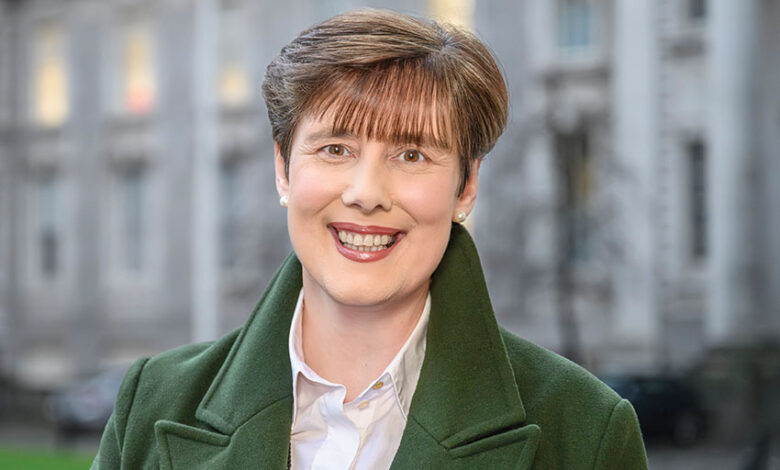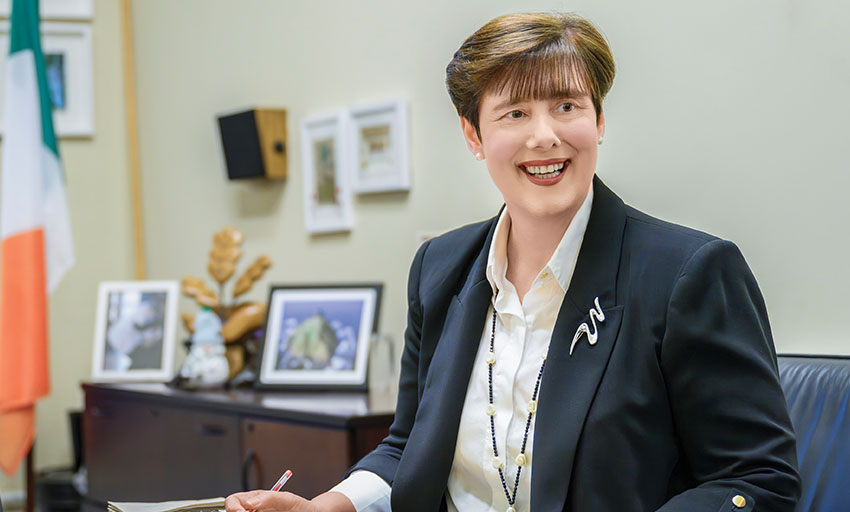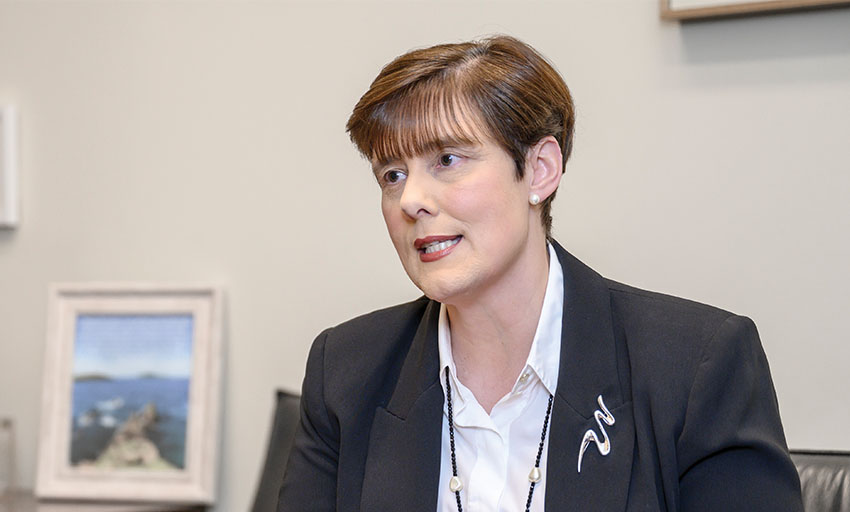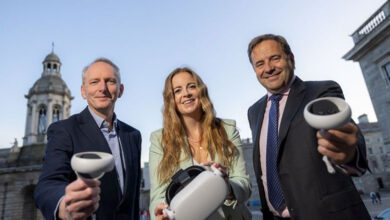Education Minister Norma Foley TD: ‘Education is the great leveller’

While she follows in a long line of Fianna Fáil education ministers, Minister for Education Norma Foley TD became the first Kerry woman to sit at Cabinet when she was appointed in June 2020. The Minister sits down with Ciarán Galway to talk equality of opportunity, access, teacher recruitment, reform, and her vision for education in Ireland.
Sitting at a large conference table at the centre of her office off the ministerial corridor in Leinster House, the Education Minister is overlooked by select scattering of children’s artwork exhibited on the walls, not least an homage to the woman herself. Naturally enough, these are complemented by picturesque County Kerry landscapes.
Norma Foley is equipped with over 20 years of teaching experience – first as an Irish and English teacher at St Aloysius in Carrigtwohill, County Cork and then at Presentation Secondary School in her hometown of Tralee.
Allied to this is a strong political lineage – her father Denis Foley was twice elected as a Fianna Fáil TD for Kerry North. Ascension to the education portfolio, therefore, appears to be a perfect marriage of her persona.
Having previously served on Kerry County Council between 2004 and 2019 – including as mayor in 2018/2019 – Foley secured the fifth Dáil seat in the Kerry constituency for Fianna Fáil in February 2020. Embarking on a career break from her teaching post, following government formation she achieved the distinction of becoming the first woman from Kerry to sit at Cabinet when she was appointed Education Minister.
Acknowledging that she has brought “a particular perspective” to the role, the Minister recalls: “I would always say to my own students that my ambition for them is limitless, there is nothing that they cannot do, and nothing that they should feel that they could not achieve. We need to make sure that they have the support and the opportunity, at all times, to realise whatever their dreams or ambitions might be.”
Priorities
Outlining her strategic priorities as Minister for Education, Foley identifies several key policy themes and associated initiatives, including:
- equality of opportunity;
- access to education; and
- inclusive education.
Free schoolbooks
Foley’s self-stated priority in education is equality of opportunity. Rationalising the introduction of the free schoolbook initiative at primary school level at a cost of €55 million in 2023/2024, she insists: “I do not believe that any child should feel disadvantaged, because they did not have the resources at home to purchase whatever they require for school or for their education.”
However, while Budget 2024 extended the initiative to Junior Cycle students at a cost of €67 million, political opponents criticised this iterative approach, characterising it as a ‘missed opportunity’ to make both primary and secondary school education ‘genuinely free’.
Responding to this, the Minister defends the decision, indicating that there was method behind the initiative’s implementation, including a budgetary consideration, and a determination to ensure its success.
Articulating her department’s logic, she explains: “We are doing it this way because we were very clear that there would be great learning for us out of how it went in primary schools. A review has been done and is ongoing in relation to how that worked, what might we do differently as we move into the post-primary element of it, and we bring that learning into post-primary. Then how it works at Junior Cycle level will inform how we will deliver it at Senior Cycle.”
“Fianna Fáil has always believed that education is the great leveller. I believe that fundamentally myself.”
Minister for Education Norma Foley TD
Special education
Our conversation then pivots to special education. After announcing the establishment of four new special schools for 2024/2025 in Limerick city; Enfield, County Meath; Gower, County Wexford; and in “the south Kildare area”, in addition to seven special schools established in Dublin and Cork in the previous four years, the Minister is evidently buoyed.
However, as government seeks to recruit 744 additional special education teachers into the profession, alongside 1,216 additional special needs assistants (SNAs), ensuring sufficient skills capacity will inevitably be a challenge.
Yet, with over 20,000 SNAs – and a target of 21,000 by the end of 2024 – already among 40,000 professionals dedicated to special education, the Minister insists: “We have not had difficulty around [recruitment of] SNAs, I want to be very clear around that. We have very good uptake and [they are] adding so much and bringing extraordinary giftedness also into the world of special education.”
In terms of special teachers, meanwhile, the Minister emphasises that “we are a country at near full employment” and that this is creating a staffing challenges in education, as well as other sectors.
Staffing initiatives
Outlining the measures introduced by the Government in response to these challenges, she highlights:
- the introduction of a €2,000 bursary for postgraduate teaching students upon completion of their course;
- free of charge upskilling courses for teaching staff to support subject areas which are experiencing particular challenges;
- 1,000 additional posts of responsibility being introduced;
- working with the higher education institutes to release 3,000 student teachers into the system in 2023/2024;
- increasing the number of days being provided by retired teachers into the system;
- exploring shared teacher schemes; and
- introducing a pathway for teachers who qualified outside the State to register complete their Droichead induction in Ireland.
“We are constantly looking at ways and means to ensure that there is a sufficiency,” Foley remarks, qualifying: “But I do not for one minute underestimate the challenge and the difficulty that there can be for principals in particular areas at particular times. So, we are happy to look at any measures going forward as well. We have been proactive in this space and will continue to be proactive in the space.”
Teacher shortage
Regardless, a collaborative recruitment and retention survey published by the Irish National Teachers’ Organisation (INTO), the Irish Primary Principals’ Network (IPPN), and the Catholic Primary Schools Management Association (CPSMA) in November 2023 indicated that there was an “unprecedented level of vacant teaching posts in primary and special schools”.
INTO Deputy General Secretary Deirdre O’Connor commented: “This survey indicates that in the schools who responded, there is a current shortfall of 809 teaching posts in the schools surveyed, with another 1,202 expected vacancies in the next three months. In the midst of a staffing crisis in our schools, particularly in our urban areas, all options must actively be explored to ensure that no child is left without a qualified teacher.”
Asked about the extent to which the shortage of teachers in primary and secondary schools can be characterised as a recruitment and retention crisis, the Minister insists that retention is not a challenge.
“Our staff that are in the system are staying in the system by and large,” she says: adding: “Even in terms of those who might choose to leave early, it is very, very low if you were to look at it comparatively across other sectors.”
On recruitment, Foley responds: “It is important to say that we have never had as many teachers registered with the Teaching Council as we do presently.”
While this statement aligns with the fact that the Register of Teachers has expanded each year since 2006, with an annual net growth of 3,600 registrants according to Director of the Teaching Council, Lynn Ramsey, it may suggest that even increased teaching numbers cannot keep pace with rapidly evolving demographic pressures.

CAO applicants
However, as a third-level qualification, teaching, the Minister insists, is still an attractive option for CAO applicants. “Across the CAO, we have seen a 14 per cent increase this year [2023] and that is on top of 9 per cent increase last year [2022],” she highlights.
Not taking account of trends prior to 2022, this is accurate in one sense. CSO figures from July 2023 recorded 2,450 first preference applications for primary teaching and 2,561 first preference applications for post-primary teaching, compared with 2,592 and 2,242 in July 2022 respectively. This represents an annual decrease of 5.5 per cent in primary teaching and an annual increase of 14.2 per cent in post-primary teaching.
Challenges
Acknowledging that there are “difficulties and challenges in some areas” of teacher recruitment, the Minister restates the Government’s measures to address these and reiterates: “There will always be challenges, but again, you must remember, there is a backdrop of near full employment in this country.”
Overall though, as “somebody who comes from the teaching profession”, the Minister believes that teaching remains an attractive career prospect, as illustrated by CAO applications. Again emphasising that teaching “it is not a career without challenges”, she concedes that “more and more has been asked every single day of the education sector”.
Illustrating this point, she highlights the pivot to remote learning during the Covid pandemic, and classroom demographic changes amid the Russian invasion of Ukraine as two examples of “the education sector [stepping] up to the mark every single day”.
Housing crisis
Asked about the extent to which the housing crisis and the associated dearth of affordable accommodation is impacting on recruitment, especially for newly qualified teachers, the Minister emphasises that “the issues around housing are impacting lots of people in lots of different careers and professions” and that government is “being proactive in this space”.
“It is no one measure that is going to eradicate the issues that we have at the minute but there is a general acknowledgement across government that – and [Housing] Minister Darragh O’Brien TD is working assiduously in this area – a whole suite of measures at different times to meet the different needs and the different challenges of people is what is required and each one of them needs to be supported,” she remarks.
Senior Cycle reform
Pivoting to address a final priority, the Minister delves into Senior Cycle reform. Alongside a new Primary Curriculum Framework, in March 2022, the Minister published the plan to reimagine Senior Cycle education. Guided by a vision of “equity and excellence for all”, the plan has three objectives:
- “empower students to meet the challenges of the 21 century”;
- “enrich the student experience and build on what is strong in our current system”; and
- “embed wellbeing and reduce student stress levels”.
“We have a Leaving Certificate, which is very highly respected and rightly so, but we have an acknowledgement as well that we can never stand still in education and if we want our young people to compete as we are doing here, for example, in [the OECD’s 2022 Programme for International Student Assessment (PISA) 2022], but to compete across the world now, they have to have appropriate curricula and they have to have appropriate assessment as well.”
Consequently, an updated programme was announced in September 2023 to accelerate Senior Cycle reform, including the introduction of two new Leaving Certificate subjects – drama, film and theatre studies, and climate action and sustainable development – for students in 2024/2025.
Contextualising this, the Education Minister contends that an achievement in a subject like drama, theatre, and film studies should have parity with an achievement in any other subject “because that is a talent and that is an ability”.

Assessment
As well as introducing new subjects, the government is also overhauling Senior Cycle assessment. On a personal level, Minister states that she “never felt it was right that 100 per cent of a student’s ability could be examined on one single day in one moment in June”.
In practice, this means ensuring that each subject has a second assessment component. As such, in future, at least 40 per cent of each Leaving Certificate subject will be assessed by the State Examinations Commission (SEC) prior to students sitting exams in June.
“The type of assessment will be different to what they are doing presently. For example, there will always be a place for the written exam but there has to be a place as well for application of knowledge,” she insists.
Similarly, since the Covid pandemic, students have been provided with an opportunity for a second sitting of the Leaving Certificate. Emphasising the Department of Education’s role in serving students, the Minister adds: “I think that is fair. I think if there are circumstances from a health and wellness point of view that prevented a student from taking an exam in June, to the best of our ability we should be able to provide a second opportunity.
“I want students to succeed to the maximum. For them to be able to do that, I have to ensure that they get the maximum of facility to do it… recognising their individuality in terms of their various talents.”
Referencing generative artificial intelligence (GenAI) in the context of assessment, the Minister notes that a work is underway. “We have tasked the SEC to look specifically at how we can harness the opportunity that AI is bringing to us, but also be mindful of the challenges. That also will inform how Senior Cycle and how education will work going forward.”
All-island cooperation
Turning to the Government’s efforts to deepen all-island education connections and cooperation, Foley indicates that “a significant body of work is underway under the auspices of the Shared Island Programme”.
“We are currently working on a north/south programme – and more of those details will unfold – but it is specifically in the area of education, and specifically in the area of [tackling] disadvantage in education and promoting equality of education.
“I am a huge believer in the wisdom of the collective. We can garner so much more when we work with others and there are great opportunities in education for us to share expertise and wisdom and experience. We are in the throes of doing that now, and you can see it from a higher education point of view in terms of research and an infrastructure point of view. Financial supports have already been put in place. There is enormous scope. Look, we are one island at the end of the day.”
Asked if she has given consideration to the INTO’s calls for an all-Ireland teaching council to be established within the Department of the Taoiseach’s Shared Island Unit amid the “erosion of teachers’ conditions in the North”, the Minister is reticent.
“I am not going to comment on that,” she says, before adding: “Look, we have young people from Northern Ireland who are [living] on the border and working in the south, and we have people [living] in the south and working and crossing over.
“Obviously, the more closely we can work together, learn from each other, and support each other [the better]… Opportunities going forward in terms of the teaching council and all of that, I have no doubt that all these opportunities can be looked at going forward.”
“Look, we are one island at the end of the day.”
Vision for education
Asserting that education is at “the very core” of her party’s philosophy, Foley outlines: “Fianna Fáil has always believed that education is the great leveller. I believe that fundamentally myself. It is the great leveller in society. If we can get it right in education, ultimately, we will get it right in society. That means ensuring that we have an education system that is inclusive, that is open and welcoming to everyone, and that is ambitious. We should always be ambitious as a country, so we should always have an ambitious education system.”
Paying tribute to the “many who contributed to the richness of education”, Foley articulates her belief in “the capacity of Irish people”. “We see Irish people perform every day, not just on the local and the national stage, but on the international stage. That is the consequence of opportunity being provided, supports being provided, a good education, and a rootedness in community. I would like to think that we will continue that; that we will continue in education to promote equality, to promote inclusion, and to promote opportunity and access for all.”





